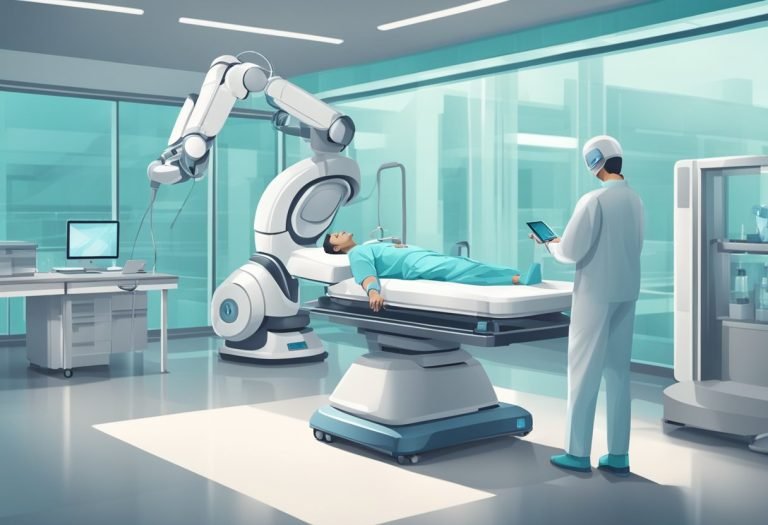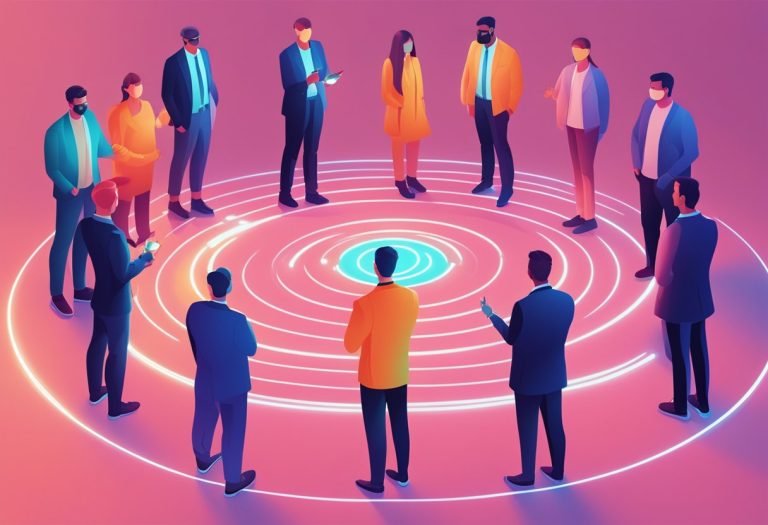Will AI Replace Lawyers: Understanding the Future of Legal Practice
Artificial intelligence is changing many industries, and law is no exception. Some wonder if AI could replace lawyers. The answer is clear: AI will not replace lawyers, but it will transform how they work.

AI tools are enhancing legal research, making it quicker to analyze large amounts of data. These advancements help legal professionals provide more accurate advice and support. AI is also assisting in litigation support, where systems can sort through vast case files and identify relevant information quickly.
The ethical considerations of using AI in law are significant. It’s essential to balance the benefits of technology with the need for human judgment in critical legal decisions. Understanding where machines excel and where humans have an edge is crucial for the future.
Key Takeaways
- AI is transforming legal research.
- Lawyers’ roles are changing, not disappearing.
- Ethical AI use is essential in law.
Technological Advancements in Legal Practice

The legal field is seeing rapid changes due to technology. Key areas driving these changes include natural language processing, machine learning, and blockchain. These tools are transforming how lawyers work and deliver services.
Natural Language Processing in Law
Natural Language Processing (NLP) is playing a significant role in the legal industry. It helps automate the analysis of legal documents, making the process faster and more efficient. NLP can extract relevant information from lengthy contracts, identify key clauses, and flag potential risks.
Key Benefits of NLP:
- Speeds up document review
- Enhances accuracy in identifying legal terms
- Reduces manual workload
By integrating NLP, law firms can improve their operational efficiency and reduce the time spent on routine tasks. This allows legal professionals to focus more on client-specific issues and strategic planning.
Machine Learning for Legal Analytics
Machine Learning (ML) has become essential for legal analytics and decision-making. ML algorithms can process vast amounts of case law, statutes, and regulations to provide insights and trends. These insights help lawyers predict case outcomes and understand how judges might rule on similar cases.
Applications of ML in Law:
- Predictive analytics for case outcomes
- Analyzing past case data for strategic planning
- Automating document classification
Law firms are using ML to enhance their analytical capabilities, enabling them to serve clients more effectively. It supports more informed decision-making by identifying patterns and correlations that would not be evident through manual analysis.
Blockchain for Smart Contracts
Blockchain technology offers a secure and transparent way to manage smart contracts. These self-executing contracts have terms and conditions written into code, making them reliable and tamper-proof. Blockchain ensures that once conditions are met, the contract automatically executes.
Advantages of Blockchain:
- Ensures data integrity and security
- Reduces the need for intermediaries
- Provides real-time updates
By utilizing blockchain, legal operations become more efficient and streamlined. Firms can minimize errors and enhance trust among parties involved. Moreover, the transparency and immutability of blockchain make it an ideal solution for contract management in various legal settings.
AI’s Impact on Legal Research

AI is changing legal research by improving how quickly and accurately lawyers can find relevant cases and legislation. Key developments include automated case retrieval and predictive analysis technologies that are reshaping the legal landscape.
Automated Case Retrieval
Automated case retrieval has transformed how lawyers access legal information. AI systems can now scan vast databases to locate pertinent cases within seconds. This capability saves time and increases accuracy, allowing lawyers to focus on more strategic tasks. Tools like AI-powered legal research systems help in analyzing data and pinpointing critical information efficiently. The reduction in manual searching leads to quicker turnarounds in legal processes, which enhances productivity.
Predictive Analysis in Legislation
Predictive analysis in legislation uses AI to forecast legal trends and outcomes. By examining historical data and patterns, AI helps predict how current laws might be applied in future cases. This technology supports lawyers in developing more informed strategies and anticipating potential legal challenges. Legal professionals are increasingly relying on these tools to make data-driven predictions about legislation changes and their impact. As AI continues to evolve, its accuracy in legislative forecasting will likely improve, further supporting legal decision-making processes.
The Role of AI in Litigation Support

AI is transforming how lawyers handle litigation support through advancements in data analysis and automation. These technologies are enhancing processes like e-discovery and improving the creation of legal documents.
E-Discovery and Data Management
E-discovery involves collecting and reviewing digital information for litigation. AI tools excel here by quickly processing large volumes of data. They can identify relevant documents, reducing the time and cost associated with manual review. AI algorithms categorize data based on keywords or patterns, helping lawyers pinpoint crucial information.
In data management, AI enhances data security by identifying risks and suggesting protective measures. This ensures data integrity throughout legal proceedings. AI can also generate data insights, offering strategic advantages during case preparations.
AI-Assisted Legal Documentation
Creating legal documents requires precision and attention to detail. AI assists lawyers by automating repetitive tasks like drafting agreements and reviewing contracts. Natural language processing tools can suggest edits or amendments, improving document quality.
These tools also help in maintaining compliance by checking for outdated terms or regulations, ensuring that all documents adhere to current legal standards. AI’s ability to process vast amounts of text swiftly enables lawyers to focus more on strategic aspects of cases rather than administrative tasks.
Ethical Considerations for AI in Law
In the legal field, AI introduces various ethical challenges like data privacy and accountability in decision-making. These are crucial as they determine the reliability and trustworthiness of AI systems used by legal professionals.
Data Privacy and Security
AI systems in law often handle sensitive personal data. Protecting this data becomes essential. Legal professionals need to ensure that AI tools comply with regulations such as the General Data Protection Regulation (GDPR). Ensuring data is securely stored and protected from breaches is critical.
Encryption and access controls are fundamental security measures. They help mitigate unauthorized data access. Additionally, constant monitoring and auditing of AI systems can prevent misuse of data and maintain privacy standards.
Accountability and Decision-Making
AI tools can assist lawyers, but decision-making accountability remains with humans. Ensuring transparency in AI systems is vital so that outcomes can be easily audited and understood. This transparency helps in attributing responsibility when AI is involved.
Legal professionals must verify that AI systems produce fair and unbiased results. Regular assessments are necessary to check for algorithmic biases. Proper oversight during AI operations can avert potential ethical pitfalls, thereby maintaining trust in AI-assisted legal practices.
Human vs. Machine: Abilities and Limitations
Artificial intelligence offers incredible efficiency and speed in legal tasks, yet it lacks human intuition and creativity. While machines handle large data sets quickly, human lawyers excel in areas needing deep understanding and innovative thinking.
Complex Reasoning Abilities
Human lawyers possess the ability to manage complex legal reasoning, which is often required in intricate legal situations. They can interpret laws contextually and consider social implications beyond just the data. AI, on the other hand, excels in processing vast amounts of information. It can automate repetitive tasks like document review but struggles with the nuances of legal interpretation. Machines follow programmed rules and rely heavily on existing data, limiting their ability to handle unforeseen complications.
While AI supports human decision-making by providing detailed analytics, it lacks the capacity for judgement-based reasoning. Human oversight remains essential, especially when legal concepts are intertwined with ethical or moral considerations.
Creative Legal Strategies
Creativity is another area where human lawyers hold a significant advantage. Developing legal strategies requires not just knowledge of the law but also creativity in building an argument. Lawyers often consider factors such as client relationships and unique case aspects to craft compelling strategies.
Machines, while effective in enhancing efficiency, do not create strategies independently. They can highlight precedents and assist in research but lack the ability to devise novel approaches. This creative component remains a distinctly human capability crucial for successful legal outcomes.
The Future of Legal Employment
AI is set to change the landscape of legal work, affecting job roles and educational requirements. Lawyers will see new career opportunities emerge and shifts in how they train and learn to adapt in this evolving field.
Career Opportunities in the AI Era
AI’s growth in the legal profession opens new roles for those skilled in technology. Legal technologists and AI specialists are increasingly in demand. These professionals assist law firms in integrating AI tools, optimizing workflows, and improving efficiency.
Lawyers with an interest in technology can become valuable assets, working alongside AI to streamline processes. Roles in compliance and data privacy are also expanding, as AI use necessitates robust data protection. As firms adopt AI, these positions offer growth and advancement opportunities for tech-savvy individuals.
Shifts in Legal Education and Training
Legal education is evolving to include technology-focused courses to prepare future lawyers for the AI-driven industry. Law schools are introducing AI ethics, blockchain technology, and machine learning classes, emphasizing tech literacy.
Training programs and workshops help practicing lawyers update skills. Continuing education on AI tools and data management is vital for staying relevant. Legal professionals must adapt to these changes, ensuring they possess the expertise needed in an increasingly tech-centric environment. This shift also encourages law schools to build stronger partnerships with tech companies, facilitating better exposure to practical AI applications in law.
Conclusion
Artificial intelligence is increasingly becoming a key player in the legal field. It is used to analyze documents, perform legal research, and even predict case outcomes. This integration helps lawyers save time and improve accuracy in their work.
Despite these advancements, AI is not set to replace lawyers entirely. Human skills, such as empathy and judgment, are crucial for navigating complex and sensitive legal cases. Machines lack these capabilities and function based on data and algorithms.
AI can serve as a valuable tool for legal professionals. By taking over repetitive tasks, it allows lawyers to focus on strategic and human-centric aspects of their duties. This collaboration between technology and humans can enhance the efficiency of legal services.
Key Takeaways:
- AI is not a complete replacement for lawyers.
- Human judgment remains essential in law.
- AI improves efficiency in routine legal tasks.
The future of the legal profession lies in the balance between AI technology and human expertise. Together, they can create a more efficient legal system that benefits both practitioners and clients.







